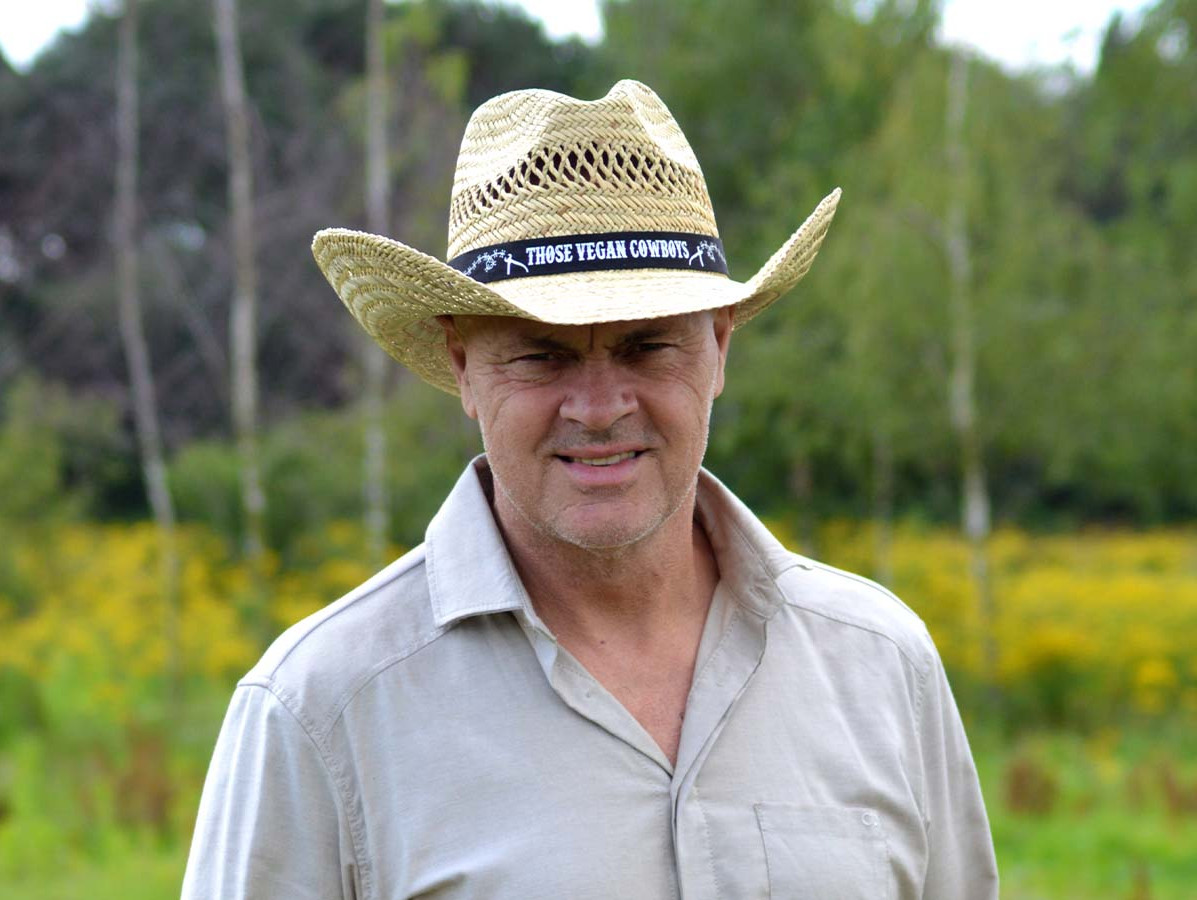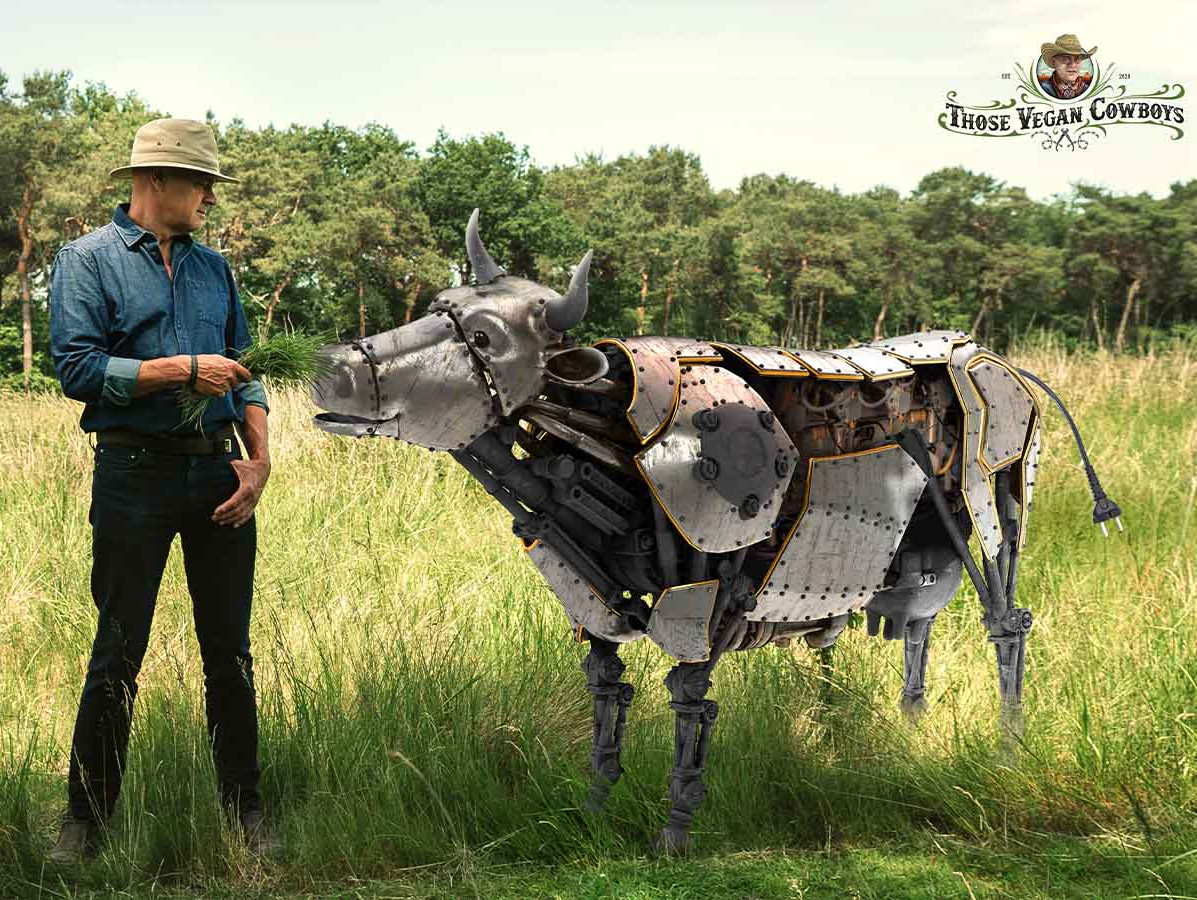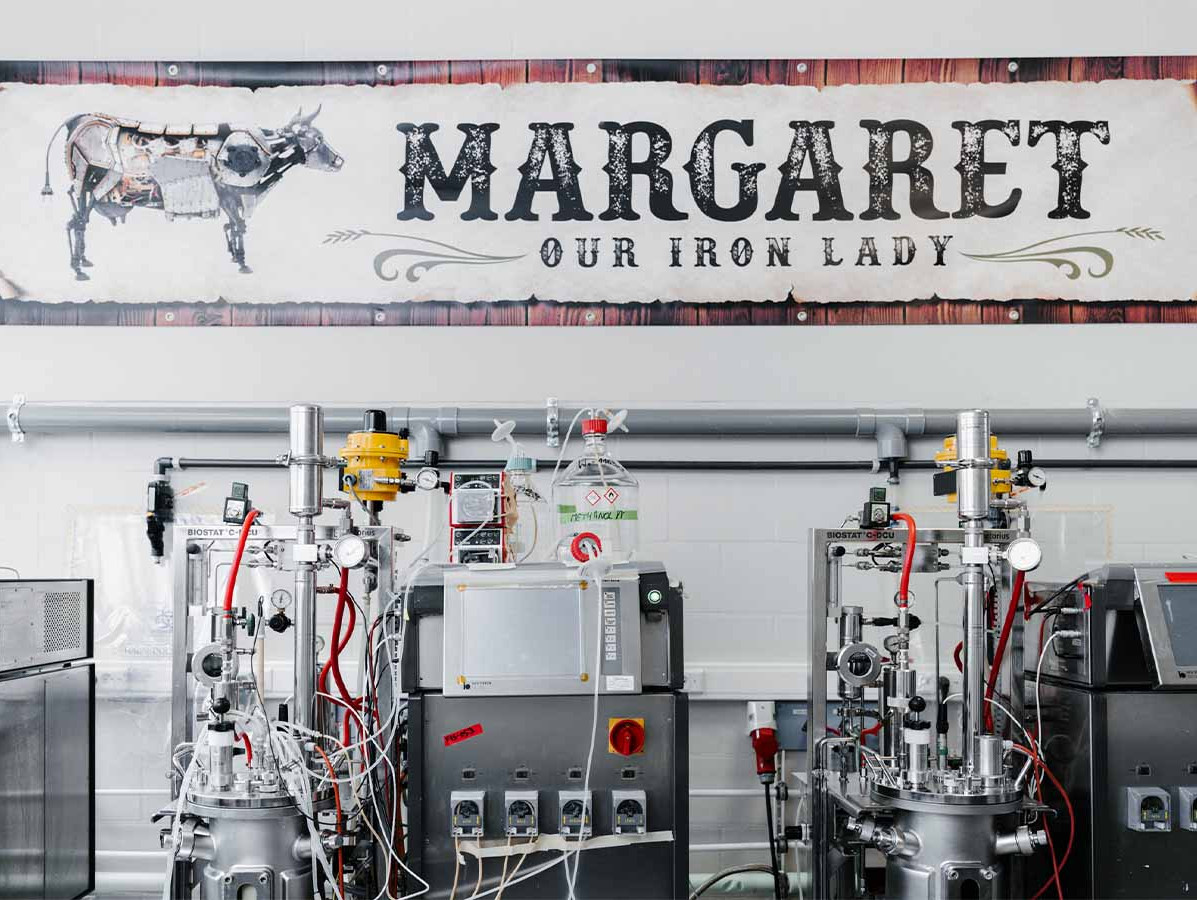
Jaap Korteweg is a man with innovative ideas who never stops at just dreaming. He takes action, rolls up his sleeves, and gets things done—that’s what defines Jaap Korteweg. After founding De Vegetarische Slager and selling this successful brand, he ventured into new projects: Those Vegan Cowboys and “Nieuwe Vroenten”. The down-to-earth optimist shares his plans, concerns, and vision for the future.
The proof is there: it is possible to make real cheese, with the same beloved texture, taste, and functionality as animal-based cheese, without using a living cow. To achieve this, Those Vegan Cowboys built a stainless-steel cow, affectionately named "Margaret" by the team of technicians and scientists. In "Margaret," precision fermentation takes place. "We have microorganisms do the work that happens inside a cow," Jaap explains. "In a nutshell, we add a piece of DNA to yeast, mold, or bacteria—the DNA that is responsible for producing casein in cows. Casein is the specific protein that cheese is made from. These yeasts only need nitrogen and energy to start producing the protein."
Jaap, resolutely: "Because if it succeeded, that 1% would absolutely be worth the effort! The benefits are enormous. First and foremost, in terms of animal welfare. My main motivation is to remove all production animals from the food chain. We don’t need cows to make delicious cheese. Additionally, this method is far more efficient in terms of land use. When we started, dairy and grassland scientists calculated that with this concept, we could theoretically produce five times more cheese on the same amount of land. That efficiency has now been confirmed in practice. There are also major benefits for the climate and our health, which I consider in a broad sense. The way we currently use animals carries a high risk of zoonotic diseases spreading to humans. All those outbreaks of zoonoses are really worrying. We can eliminate that risk if we stop animal production."
“We won’t make that in Europe. That has to do mainly with novel food regulations, which this technique falls under, and the process we still need to go through. In the U.S., we expect to have approval next year to bring our cheese to market. When we start there next year, it will still be on a very small scale."

“There’s a lot of interest. We are already collaborating extensively with major dairy companies, both national and international. They are testing our casein to see if they can make good products with it. At the same time, we are also working on optimizing the process, as the production per kilogram of input is still too low.”
"That seems quite possible!" he says confidently. "Compare it to solar panels. Ten years ago, they were incredibly expensive. Now they are much cheaper and much more efficient than the first generation of panels. Recently, we’ve called on investors to step in and support further development, and we are in talks with several parties." Realistically: "This will take time; it’s a new business. It takes time to understand what we’re doing and the opportunities involved, more than if you were dealing with a conventional product."
“Plant-based will continue to grow. But I’m not a prophet. Of course, I hope these positive developments continue, but I also know that people don’t always make sensible choices. People can be very irrational, even collectively.”
You are a biological farmer yourself, with an organic farm. With the “Nieuwe Vroenten” concept, you’re taking it a step further. Can you tell us more about it?
His voice becomes more animated as he begins: “Yes! It’s the desired living environment of the future. A self-sufficient residential and work landscape of a thousand hectares for six thousand people from all walks of life. We will showcase all the benefits that are already technically and economically possible, on a scale where you can really experience it: an area of approximately 3 by 3.5 kilometers in Brabant.”
“Brabant is the most livestock-dense province in Europe. A lot of farmland from outside Brabant is needed to keep the whole system going. Imagine that we suddenly have to close the borders to all imports, because of another pandemic, for example. At that moment, we would have to slaughter all livestock immediately, or we’d starve. This applies to the entire Netherlands, but especially to Brabant.”
“The challenge isn’t technological. Many solutions have already been thought of: plant-based agriculture, gray water for flushing toilets, reusing minerals from human waste. In this project, we will produce enough calories for the six thousand people living there, which is the expected population density per thousand hectares in 2050. If we replace all animal products with plant-based ones in our diet, we will free up a lot of farmland. We’ve calculated that with a complete switch to plant-based, you could feed the entire Dutch population, even with predicted population growth, by 2050 using just 60% of the current agricultural land. Pesticides and artificial fertilizers wouldn’t be necessary anymore because those high yields wouldn’t be needed. We could manage with much less land. That means 40% of the land could be used for other purposes—nature, housing, whatever you can think of.”
"There is one important point," Jaap mentions in passing. “There’s no place for pets: no dogs, cats, rabbits, guinea pigs, or birds in cages. Did you know that feeding all the dogs and cats in the Netherlands alone takes up one-third of the country’s agricultural land? I didn’t realize it was that much myself.”

“There’s indeed a lot of fear about giving that up because we love them so much. But I’m convinced that we can completely move away from using animals, without having to sacrifice anything. Not even good food. It’s not a big sacrifice; in fact, it’s not a sacrifice at all. I know it well, because I used to be a big meat lover myself. At an event by Ruys where I recently spoke about this, there were many people from the meat industry. I can only say that I got a lot of positive reactions to my story, and also to the vegan bitterballen that were served.”
“Compare it to electric cars,” he continues. “The debate between ‘petrol heads’ and electric car enthusiasts is similar to the discussion between lovers of ‘old meat’ from animals and lovers of ‘new meat’ from plants. It often revolves around emotion. China was never strong in the car industry but has now completely taken over the electric vehicle market. In Europe, we missed that opportunity, from a business standpoint. New products, even sustainable ones, often face resistance at first. But when they become cheaper, and in the case of cars, better and faster, or in food, tastier and healthier, that emotional burden starts to shift… it can shift. In Italy, for example, they want to ban cultivated meat from entering the market. If that happens, of course, it’s game over. Then it won’t happen there.”
“What we’re seeing is that Europe is falling behind in many areas,” Jaap continues after a brief pause. “The example of electric cars is a huge warning. If we continue to act conservatively and protect established interests, we’ll miss the boat. Turning a blind eye to the latest developments can be extremely harmful.”
"That’s the goal! I’m all about practicality and action. Otherwise, it’s pointless. Together with scientists, we’ve calculated that all the energy needed can be generated within the area. That doesn’t mean nothing will come in or go out. Certainly not! There won’t be a fence around it. The point is that the area will be energy- and calorie-neutral. And if a situation arises where the borders do close… yes, life might get a bit boring, because there won’t be any oranges, for example, but there will be enough food to survive."
“Hahaha, well, you can sign up via www.nieuwevroenten.nl,” Jaap replies cheerfully. "There’s no obligation, but it allows you to follow the project. Ultimately, it has to grow from the ground up. We hope that people living in the area will develop activities themselves to create more support for “Nieuwe Vroenten”. This year, we’ll be at Dutch Design Week, and we’re going to try to get as many Dutch people as possible to sign up to show the government that people want this. Although that doesn’t seem to be an issue at all."
Source: Vakblad Voedingsindustrie 2024